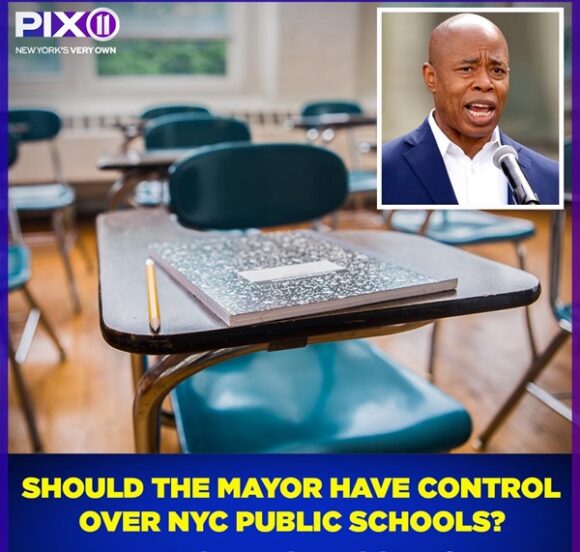Dear Commons Community,
My colleague, David Bloomfield, has an op-ed (see below) in today’s New York Daily News that presents the case for ending mayoral control of New York City public schools and passing it on to the City Council. His piece is timely given that public hearings start tonight on this issue.
If you are at all interested in this subject, David’s piece is a must read.
Tony
——————————————————————————————————————–
The New York Daily News
Try city control of city schools: The NYC Council should be in charge
By David Bloomfield
December 5, 2023
Starting tonight, a new round of public hearings begin on whether to scrap mayoral control of the New York City public schools. Yes we should and the replacement should be City Control.
Strains on the current system have become open wounds. The mayor’s appointive power of the chancellor and the Board of Education, called the Panel for Educational Policy (PEP), has morphed into politicized autocracy. The City Council has no direct authority over the Department of Education, relegated to passing reporting requirements rather than statutory controls.
Community control remains a fervent wish among some, promising a degree of local self-determination never fulfilled after the teacher strikes of 1968. But the demise of community control demonstrates its impracticality. School funding comes from the city’s general fund; contracting, whether for employment or goods and services, are citywide responsibilities, as are technology, facilities and legal liability. Student assignments are widely dispersed through specialized programming and school choice.We are one city, bound educationally through inextricable networks of collective interaction. Most of all, we need citywide solutions to issues of quality, equity, and diversity. Balkanizing control among our still-existing community school districts through low-turnout elections is a dream at odds with political and fiscal realities.
Eliminating the PEP’s mayoral majority with more members with fixed terms is a cure worse than the disease. That was abandoned in 2001 in favor of mayoral control, an apt testament to its failure to produce either adequate funding or educational quality. Electing the board through city-wide elections (borough-based seats violate one-person- one-vote rules and parent-only elections amount to taxation without representation) are likely to lead to the type of political turmoil and questionable policies we see elsewhere in the nation.
The key to improving school governance may be hiding in plain sight. The City Council, distrusted by the Legislature in 2001 when it originally crafted mayoral control, has secured broader public respect over the ensuing decades. It has developed a strong reputation for educational advocacy and policy acuity, as well as governing by consensus to keep it from the culture wars and procedural paralysis of a free-standing board.
The past two Council speakers have shown respect for their limited role in education by appointing able Education Committee chairs who, in turn, held the mayor to close account through public hearings and greater data-based transparency.
It is time to reward this record and improve school governance by recasting mayoral control as city control, aligning educational governance with other city services. There are important advantages to this concept, perhaps most importantly to give a powerful voice to individual community interests now lacking in the mayor’s hegemony over the DOE and encouraging delegation of instructional policies to educators at Tweed, in the districts, and to parents through parent associations and Community Education Councils.
The state Education Law establishing mayoral control is already largely consistent with replacing the ineffectual PEP with an independent City Council acting as the Board of Education. The law already states that “except as otherwise provided by law, the board shall exercise no executive power and perform no executive or administrative functions.” Thus, the Council stays in its policy lane, leaving executive functions to the chancellor and the rest of the DOE in line with separation of powers.
The Council should be able to hold hearings before rendering advice and consent over mayoral nominees for chancellor after a more transparent search process. And how wonderful to replace the rubber-stamp PEP by putting the Education Committee in charge of vetting DOE proposals for “standards, policies, and objectives proposed by the chancellor directly related to educational achievement and student performance”; “regulations proposed by the chancellor”; and “all school closures or significant changes in school utilization,” including charter school co-locations as called for by the current statute.
These, as well as other oversight functions, are deserving of greater public scrutiny than possible under mayoral or community control.
After 20 years of mayoral control, a fair test of its advantages and disadvantages can be assessed. There can be no doubt the current system has staunched the school system’s previous unaccountable complacency and its pernicious reciprocal weakness, chronic mayoral underfunding. But severe problems of unilateral control and increased politicization haunt today’s education policy-making.
Whether more political involvement will improve the situation is unknown. Traditionally,though, the American way of solving this conundrum is checks and balances between electedexecutive and legislative branches. No governance structure is determinative of sound education policy, but it may be time to adopt this solution by including the Council’s broad representation of popular interests in schools’ decision-making.
Bloomfield is professor of education leadership, law, and policy at Brooklyn College and The CUNY Graduate Center.



